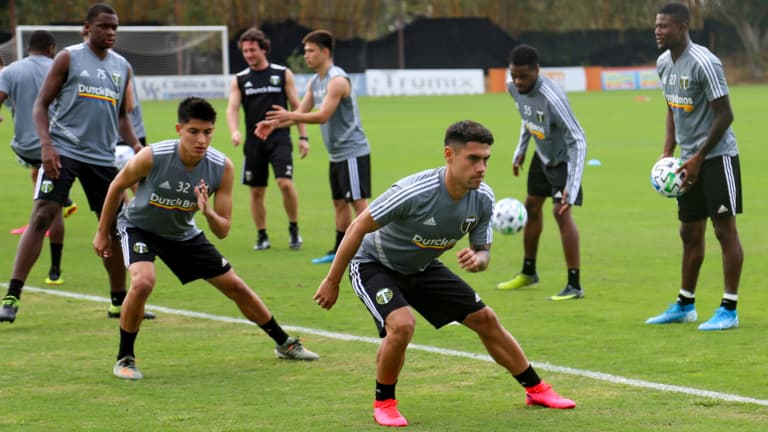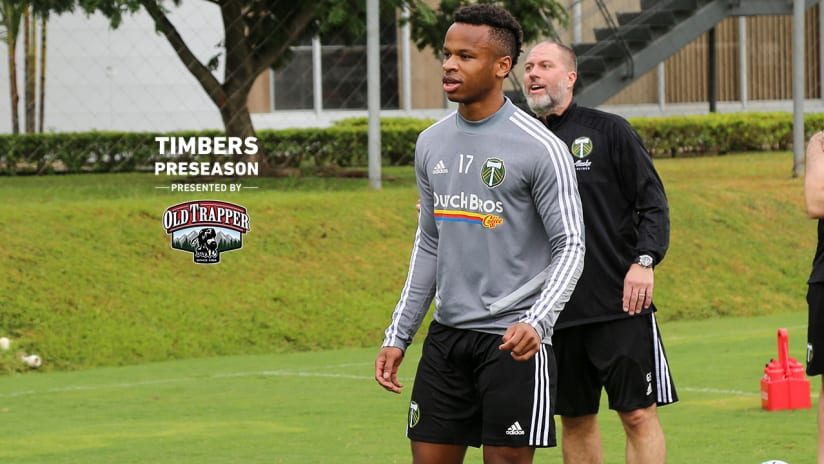SAN JOSÉ, Costa Rica -- They’re the type of observations that elicit furrowed brows when offered from those employed by a club, but welcome to the sports landscape we live in, and welcome to a world where those observations can still be true. Beginning two offseasons ago, when a change in head coach coupled by an influx of Targeted Allocation Money changed Portland’s roster dynamic, depth has had to be a point of strength. And when that depth has failed, the team has, too.
The good side of that equation can be seen in Zarek Valentin’s contributions in 2018, when he emerged from an initial backup role to start at both left and right back throughout the season. Jeff Attinella emerged as a starting goalkeeper that season, too. It can been seen in Jeremy Ebobisse’s role that same year, when the trade of Fanendo Adi, the wane of Samuel Armenteros, and the lack of production from Lucas Melano were all offset by the young striker’s emergence. And while, in 2019, there are more examples where similar options proved fruitful, the most prominent show of depth was again in goal, where Steve Clark eventually became one of the season’s most productive players.
Within the context of those years’ squads, the difference in talent between Valentin and the player he replaced, Alvas Powell, wasn’t huge. Perhaps it was even negligible. Some might see Valentin at a talent deficit compared to his Jamaican counterpart. But just as his level at the time represented a significant difference for Portland, so too did Ebobisse’s give the Timbers the best chance in 2018, as did Clark in 2019. Depth fueled competition, which produced new levels from those who claimed jobs.
As head coach Giovanni Savarese has highlighted this week, though, that dynamic can also work the other way. When, late last year, Diego Valeri wasn’t available to start the season’s most important games, it forced Sebastián Blanco from the left wing into attacking midfield. Options in the wide positions were thinned out. When, during the playoffs, injuries hit another thin position (forward), Portland neither had the choices it needed to adapt nor, before that, the depth to push everyone’s levels.
“That’s one thing that we saw, last year, in Salt Lake,” Savarese remembers, “that when Jebo got injured, and we had to make a substitution, there was no other forward to put in.
“We have to give a lot of credit to [Dairon] Asprilla for jumping in and trying to do the job.” A natural winger, Asprilla has been used as a forward at times over the last two seasons. In 2019’s final weeks, that choice was made through fewer options.
“He did a great job at that particular moment,” Savarese says. “But, there’s other moments that you need that extra forward – which, this year, we are able to have that depth that we need.”
Savarese, of course, is alluding to his team’s two latest acquisitions. On Thursday, Portland announced the signing of Polish striker Jarek Niezgoda, inking the 24-year-old to a deal that would have him occupy the team’s third and final Designated Player spot. Now, today, the team has added another high-value attacker, acquiring Chilean international Felipe Mora on loan from Mexico’s UNAM Pumas for the 2019 season.
With each move rumored weeks in advance, a conversation had started about the wisdom of acquiring so many forwards; or, more specifically, what those acquisitions mean for Ebobisse’s development. Portland’s moves hint they’re siding on one side of that discussion – that depth at his position need not hinder the 22-year-old’s development – but it’s still a discussion that has value. How and why teams made these moves, and the balance they strike while executing them, says a lot about a front office’s approach.
One thing that shouldn't be confused about that approach is the team’s evaluation of Ebobisse. Negotiations with Ebobisse toward a new contract are ongoing, with Wilkinson clear, speaking to Timbers.com, that the team “continues to value the player highly and see him as a part of our future, for years to come.” But the realities of the soccer world require you to rely on more than one option. As Portland found out in 2018, with the departures of Darlington Nagbe and Fanendo Adi, and nearly found out this offseason at the heights of Valeri’s contract negotiations, even the most cherished of players can leave, and sometimes with little notice. The Timbers have three quality strikers on their roster now, but there’s no guarantee as to how long.
Even within that reality, something feels different about Ebobisse’s situation, perhaps because his climb over the last three seasons has been so pronounced. As a rookie in 2017, the then-20-year-old only saw 317 minutes of regular-season time, and while that number increased marginally to 449 minutes the next year, Ebobisse was in Savarese’s starting XI come that postseason. Last year, in his first consistent time in MLS, Ebobisse appeared in each of his club’s games, scoring 11 times while splitting time between forward and a new position, wing.
There has to be a plan to continue Ebobisse’s development, but as Savarese said earlier this week, when asked to explain why some younger players (but not others) were included in the group that traveled to preseason training in Costa Rica, he will never be a coach that merely grants young players time. He wants players to “understand the work they need to do in order to get to where they need to be.
“One of the things, here, is that too many people give too much, too easy to players,” he explained. “I don’t believe in that. I believe in youth, I believe in development, I believe in a club that works from top to bottom, but I don’t believe in those that want to give opportunity to players just because they’re young. No. They need to earn their spot. They need to understand that it’s competition, and that’s how they’re going to succeed. If we wanted to build for them to fail, then we’d do what everybody says.”
Portland’s forward acquisitions have put Ebobisse’s path in focus, but the same questions could be asked of any player, not seeing regular minutes, who’s short of his professional peak. The arrivals of Mora and Niezgoda don’t change the realities of Marco Farfan, Aljaz Ivacic, Eryk Williamson, or Marvin Loría. Nor do they change the realities of a number of other players, perhaps now too old to be considered true prospects, but could still improve with experience. The fight in front of Ebobisse is not unique to him, nor is that fight’s impact on his development.
In one sense, though Ebobisse has already passed this particular rubicon, having beaten out his competition to become a core player in each of the last two seasons. Still, at 22, his development has to continue, and if there’s anything we can infer from his team’s recent acquisitions, it’s that they feel he’s ready for a greater challenge. Mora and Niezgoda, from the outside, look like moves that block Ebobisse, but in an ideal world, Ebobisse will prove to be on their levels.
Whether you agree with that development philosophy – and as Savarese hints in his subtext, there are multiple competing, perhaps viable points of view – there’s an internal logic to the approach. It’s also a logic that transcends Ebobisse and impacts almost every other place on the roster. Why isn’t Farfan being granted time at left back? Or Loría on the wing? The answer, while frustrating to those that disagree with the plan, is very straightforward. Those players are being asked to win their jobs, not merely wait for them.

Photo: Richard Farley / Portland Timbers
This is the reality of the Portland Timbers, and now, three years into this approach, it’s not exactly a new one. While there are players like Diego Chara, Sebastián Blanco, Larrys Mabiala and Jorge Moreira who look like locks to be consistent starters, almost every spot on the field (save Moreira’s) has enough depth to create competition. The club feels it has three starting-caliber goalkeepers. In central defense, Dario Zuparic could displace Bill Tuiloma and Julio Cascante to Mabiala’s left, knocking two part-time starters from 2019 down the depth chart. Players like Williamson and Renzo Zambrano will have to wrestle midfield minutes away from Cristhian Paredes, while internationals like Loría and Andy Polo have no guarantees they’ll take time from Blanco and Yimmi Chara. In that light, Portland’s acquisition of two new forwards feels less of a comment on their incumbent than an attempt to catch their attacking depth up to the rest of their roster.
There’s also the reality of this summer’s Olympics, where Ebobisse will likely spend his time should the U.S. qualify for Tokyo. There’s this summer’s Leagues Cup, with the Timbers organization, from the top down, intent on taking the competition seriously. There’s always U.S. Open Cup, but also the reality that, when it comes to the team’s new, imported forwards, things might not work out as planned. New leagues, cities, cultures have a way of undermining progression from previous numbers.
And if those dangers don’t derail Mora and Niezgoda? Then Portland has three quality strikers, and while it seems like rostersplaining to point it out, it’s also worth a reminder: Teams that want to win things seek as many good players as possible. Portland certainly wants to improve on 2019, and with two new strikers in tow, they seem in a better place to do so.
For teams without the Timbers’ resources, it may make more sense to employ a "play the kids" approach. Perhaps the kids are truly those team’s best options in the now; or, they’re good enough to justify moving scarce resources to other spots of the roster. Portland, though, doesn’t have to make that choice. They’re employing another approach, and while their fortunates are unlikely to settle the debates around player development, Wilkinson and Savarese clearly believe in their approach.












